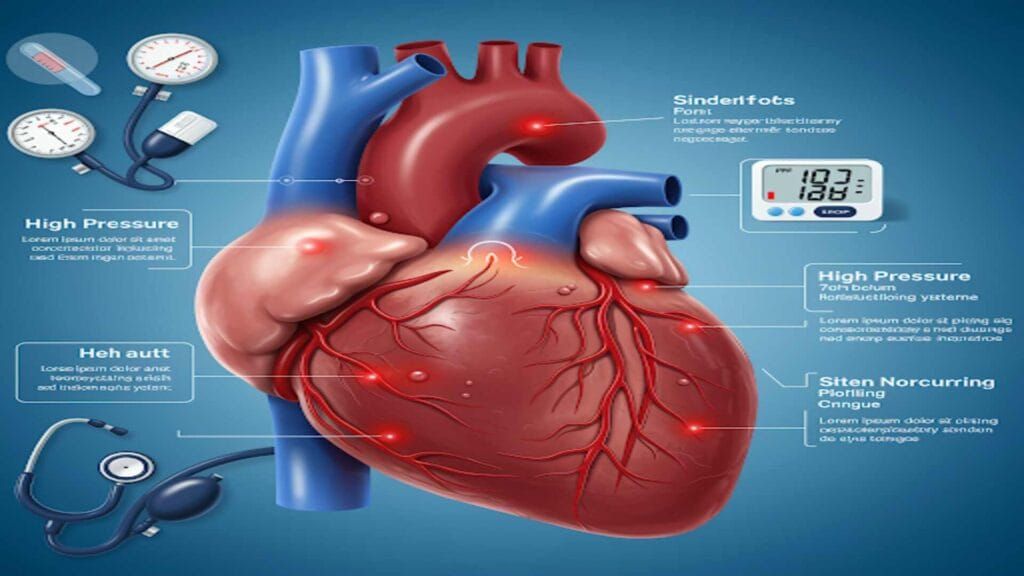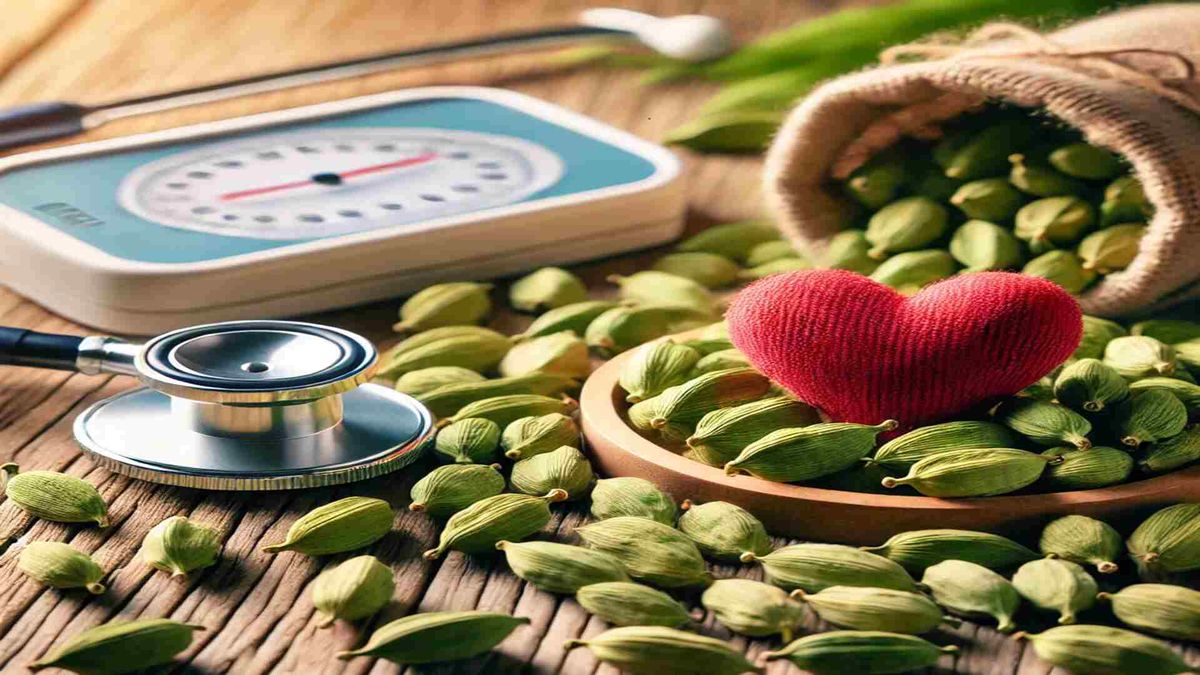In the fastest world of today, it is an issue that cardiovascular health is degrading. Stress, improper diet, and the modern way of life are reasons for blood pressure (hypertension), cardiovascular disease, and stroke. Though there are treatments given by modern medicine, natural cures always have a special place in maintaining cardiovascular health. Among numerous spices applied in conventional medicine, cardamom is diverse for its remarkable health advantages. So The Impact of Cardamom on Blood Pressure and Heart Health is most important.
Cardamom is a tiny but mighty spice, that can cure numerous diseases, such as gastrointestinal problems, swelling, and respiratory disorders. Traditional and Ayurvedic medicine has been practiced for centuries. Modern research now highlights its potential effects in treating blood pressure regulation, circulation, and lowering cholesterol, and this is an excellent option for individuals who naturally prefer to keep their hearts healthy.
In this article, we will consider the function of cardamom in managing heart diseases. Let’s observe how cardamom manages heart diseases.
What is blood pressure?

Blood pressure refers to the pressure when blood enters into our blood vessels. This is available at the meter size (MMHG). A healthy person’s normal blood pressure should be 120/80 mmHg. If blood pressure increases, it becomes high blood pressure and if blood pressure decreases, it will become low blood pressure. This might be the reason behind most bodily effects, for example, cardiovascular ailments. Well-balanced meals, low intake of salt, suitable exercise, and stress lessening are advantageous in order not to have high blood pressure.
Understanding Blood Pressure and Heart Health
Before going into the ways cardamom aids, one should know the fundamentals of blood pressure and keep a healthy level of heart. Blood pressure is the force in which the blood is pumped into the artery walls, which spreads all over the body. It is measured in the Millimeters of Mercury (MMHG) and it is taken in two numbers:
1. Systolic pressure — Pressure when the heart contracts and pumps blood.
2. Dystolic Pressure — Pressure between pulse when the heart is at rest.
The normal reading is 120/80 mmHg Nothing can get higher than this; it is hypertension which may cause serious cardiovascular complications.
Why is High Blood Pressure dangerous?
Hypertension (blood pressure) is dangerous because it puts an extra burden on blood vessels, the heart, and other organs causing serious conditions such as heart attack, stroke, kidney disease, and heart failure. Here is how dangerous hypertension can be:
- Damage to blood vessels:
Hypertension can damage the walls of the blood vessels, which are more likely to be low elastic and obstacles and tumours.
- Heart problems:
Myocardial infarction: In case of damage to arteries that provide blood to the heart, blood flow can lead to a heart attack.
Heart failure: The heart should work hard to pay blood against high pressure, which can lead to heart failure.
Angina: Reduced blood supply to the heart can lead to chest pain, also known as angina.
Heart disease: high blood pressure can injure heart valves.
- Brain issues:
Stroke: Hypertension can explode or block arteries that supply blood and oxygen to the brain, which can cause stroke.
Vascular dementia: The small blood vessels in the brain become damaged due to the accumulation of plaques and the brain becomes damaged due to hypertension fills up with the brain and can lead to vascular dementia.
What Causes High Blood Pressure?

Blood pressure, or high blood pressure, arises when the force of the blood against the artery walls is too high. Hypertension often has no exact cause, yet many factors may lead to the increased prevalence of the condition. That includes the consumption of food that is salty, sugary, and with unhealthy fats, physical exercise, stress, and adequate sleep. In addition, some medical conditions and blood pressure can be increased, such as kidney disease, adrenal gland tumours, and sleep shortness. Genetics and family history can play a role, and some are more likely to develop high blood pressure due to their genes.
How to help with cardamom to control blood pressure
1. Powerful antioxidant properties
- Cardamom is filled with flavonoids, polyphenols, and essential oils.
- Fight an antioxidant pressure, which contributes to high blood pressure.
- Protect the blood vessels from damage.
- Strengthen the heart muscles and reduce heart strain.
2.A natural diuretic acts
- Cardamom has diuretic properties, which means that it helps to remove excess sodium and water from the body.
- Reduces blood levels and reduces pressure on the arterial walls.
- Healthy kidney function prevents retaining the fluid.
3.Improves blood flow
Cardamom compounds help loosen the blood vessels, which allows for a better cycle and reduces arterial stiffness, which reduces blood pressure levels.
4.Regulating stress hormones
- Increasing cortisol and adrenal levels can cause chronic stress and blood pressure spikes. The calm effects of the cardamom:
- Reduce stress and tension.
- Which can help control blood pressure.
5. Maintenance of electrolyte balance
- Cardamom contains potassium and magnesium which are necessary to maintain normal blood pressure.
- Balancing the amount of fluid in the body.
- Support normal heart rhythms.
Cardamom’s Role in Heart Health

1. Lower bad cholesterol(LDL) and increase good cholesterol(HDL)
Cardamom helps:
- Reduce LDL cholesterol, which reaches the arteries.
- Increase HDL fat to eliminate bad cholesterol.
- Blake prevents the structure and reduces the risk of heart disease.
2. Prevents blood clots
- Cardamom contains natural anticoagulants.
- Reduce the risk of clot formation and prevents heart attack.
- Improving blood flow ensures the best oxygen supply.
3. Reduces chronic inflammation
- Inflammation in the arteries leads to hypertension. Help the anti-inflammatory compounds of cardamom.
- Reducing arterial stiffness, and maintaining healthy blood vessels.
- Reduces the risk of heart disease and stroke.
Scientific research on cardiovascular benefits of cardamom
1 . Indian Journal of Biochemistry and Biochemistry (2009): Patients who consume 3 grams of cardamom daily showed a significant drop in blood pressure after 12 weeks.
2. Journal of Dietary: Cardamom is upgraded to lipid profiles and reduces cholesterol and triglycerides.
3. Asian Pacific Journal of Tropical Biomedicine: Cardamom improves antioxidant levels and proves that it protects the heart.
How to add cardamom to your diet?

1. Cardamom tea
Boil 2-3 crushed cardamom pods in warm water. Drink daily for heart health.
2. The cardamom coffee
Add cardamom powder to your coffee for extra health benefits.
3. Cardamom water
Soak the crushed cardamom pods in water overnight and drink it in the morning.
4. Cooking with cardamom
Use curries, rice dishes, and sweet varieties to enjoy its health benefits.
Visit our store: Elevate your senses, one cardamom pod at a time.
Possible side effects of cardamom
Although cardamom is generally safe, excessive intake may cause:
- Low blood pressure (hypotension).
- Eating very large amounts may cause bloating or gas.
- Some rare cases of allergy.
- Recommended daily dosage: 1-3 g daily
Conclusion
Cardamom is a Superfood for Your Heart Natural power centre for the heart. It aids in lowering blood pressure, lowering cholesterol, enhancing circulation, and avoiding heart disease. Its antioxidant and anti-inflammatory properties are not only a boon to the diet, but also an important addition to a heart-healthy lifestyle.
Using cardamom in daily food, herbal tea, and drinks naturally helps support cardiovascular, health, supports healthy blood pressure levels. On the other hand, individuals with high blood pressure or other medical illnesses need to be checked with the doctor before adding cardamom to the food items.
When used in moderation, this aromatic spice can be incredible in promoting heart health and overall wellness.
Related to: https://pmc.ncbi.nlm.nih.gov/articles/PMC7440108/?utm_source





0 Comments